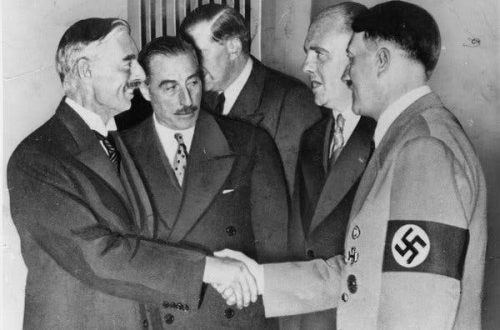Orlando Figes has been a naughty boy. The chattering classes have been chattering. On April 16, I was made aware of a short article that appeared in The Times Literary Supplement. At the time, it did not appear to be on line, but it is now. The gist of this article was that someone had been writing derogatory reviews of books by Rachel Polonsky and Robert Service on Amazon.com’s web site. The same person had been writing reviews full of praise for Orlando Figes’ book, The Whisperers: Private life in Stalin’s Russia. Given that the reviewer went by the name “Historian” but with a click of the mouse it could be noted that “Historian” was the same person as “orlando-birkbeck,” it should not be a surprise that the suggestion was made that these reviews were by Orlando Figes, a history professor at Birkbeck College. The TLS amusingly stated: “We find those suggestions implausible, and are confident that Professor Figes will tell us they are mistaken.”
It turns out that Rachel Polonsky had noted the connection to the name “orlando-birkbeck” and made Robert Service aware of her findings. Robert Service sent out an email to a number of historians noting the link to “orlando-birbeck” but did not explicitly state that “orlando-birbeck” was Orlando Figes. Figes denied that these reviews had anything to do with him and got his lawyers on the case.
Meanwhile, comments started appearing underneath these book reviews on Amazon saying that the reviews were clearly by Orlando Figes. After seeing this, the reviewer then changed the name of the reviews from Historian to Maksoludu. Robert Service received a letter from Figes’ lawyer where the accusation was made that he had tried to link the reviews to Figes. He became concerned about losing his home in a libel case. There is a difference between suspecting that the reviewer was Figes and proving it in a court of law.
Rachel Polonsky then obtained some electronic evidence that tracked an address to the reviewer. It was the same address as one Figes had lived in. She got Carter-Ruck on the case. The evidence was building up so a new tactic was tried by Figes. It was the wife that done it, he had his solicitor declare. Ultimately, it all became too much, the lies were getting out of hand. Figes came clean, admitted that it was him all along and blamed it on depression that he suffered since writing a book about Stalin’s victims.
Polonsky asks, “Are we to understand then that Figes, who is now on sick leave from his job at Birkbeck College, was so traumatised by this research that he should be seen as another victim of Joseph Stalin, one of the cruellest tyrants in human history?” Given that she does know about Stalin’s crimes, she concluded on the point, “Millions of innocent people had their mental health destroyed by Stalin. Take it from me. Whatever his PR man may say, Orlando Figes is not one of them.”
This story provides an excuse for a post in my “From the Vaults” series. In 2002, Polonsky wrote a detailed and devastating review of Figes’ book Natasha’s Dance that was published in The TLS. As a result, “literary London” was abuzz. I copy an extract below. Some may suspect that Figes has never really forgiven Polonsky for her words in this review:
The trouble with bistro culture
Inspiration, pastiche and the Russian soul
Rachel Polonsky
The TLS
September 27, 2002NATASHA’S DANCE. A cultural history of Russia. By Orlando Figes.
…. [T]he book… is largely made up of biographical material jumbled around a set of themes and historical periods which will be familiar to anyone who has taken an informed interest in Russia….
Many pages are devoted to the love affair between the late eighteenth-century Count Nikolai Sheremetev and Praskovya…. There are some moments, though, when the economy of his account comes close to that of [American scholar Priscilla Roosevelt’s book, Life on the Russian Country Estate (1995)]:
Praskovya became one of a pleiad of “girls in my house” (as Nikolai termed his stars in letters to his accountant) who were in constant attendance, travelling with him to St. Petersburg for the winter and back to Kuskovo in the summer. As Nikolai was a bachelor, the group may well have constituted a harem. (Roosevelt)
These “girls in my house”, as Sheremetev called them in letters to his accountant, were in constant attendance on the Count. They accompanied him on trips to St Petersburg during the winter and returned with him to Kuskovo during the summer. Everything suggests that they were the Count’s harem… (Figes)
Figes has added some details based on archival material. He claims, indeed, that he was “fortunate to gain access to a wider range of archives and museums than normally accessible to scholars from the West”. Such scholars would, I think, confirm that the papers of nineteenth- century noblemen, artists and critics, the only archival sources cited in this book, are generally now made available to most qualified researchers.
The chapter “Children of 1812” argues, like Lotman’s essay “The People of 1812”, that the victory over Napoleon marked a crucial turn in the shaping of national identity. Unlike Lotman’s, Figes’s argument is undermined by a lack of historical precision….
In the genre of pastiche-writing in which this book excels (space does not permit me to describe this in all its detail) there are various strategies for avoiding straightforward references. So much of what he says about Russian music is influenced by the American musicologist Richard Taruskin that Figes opts to describe his work as “brilliant” no fewer than four times in a set of endnotes that is otherwise abstemious with praise for other scholars. This apparently licenses his droit de seigneur with Taruskin’s work.
The most striking example of Figes’s cavalier use of sources, however, comes in his chapter, “In Search of the Russian Soul”, in which he lightly paraphrases the account of Russian monastic mysticism and the complex doctrine of grace in Geoffrey Hosking’s Russia: People and empire (1997), which is not alluded to anywhere in his reference material:
In the Western view, the conferring of “grace” is an act of God, granted to individual human beings either because they merit it (Pelagius) or because God in His inscrutable wisdom has so ordained (Augustine). In the Eastern view, however, “grace” is a permanent state, implied in the act of creation itself and potentially available to any human being merely by virtue of having been created. In this view, what the believer needs in order to approach closer to God is a kind of “spiritual map”, which enables him to know himself and to cope better with the snares and hazards that await him on his journey. (Hosking)
In contrast to the Western view, that grace is conferred on the virtuous or on those whom God has so ordained, Orthodox religion regards grace as a natural state, implied in the act of creation itself, and therefore potentially available to any human being merely by virtue of having been created by the Lord. In this view the way the believer approaches God is through the consciousness of his own spiritual personality and by studying the example of Christ in order to cope better with the dangers that await him on his journey through life. (Figes)
There are problems of accuracy as well as scholarly practice in Figes’s inside information about one well-known “Russian soul”….
The sense that Figes lacks first-hand familiarity with Russian primary sources, if not with the innermost intentions of Russian poets, composers and fictional heroines, is reinforced when he tells us that Count Sergei Sheremetev, last owner of the Fountain House in which the poet Anna Akhmatova lived for many years during the Soviet period, fled “with his family abroad” after the Revolution; to Paris, as he adds later, and then New York. Had Figes researched the history of the Sheremetev clan properly, as he tells us Akhmatova did, he would know that Count Sergei and his children did not, to use a verse of Akhmatova that Figes quotes, join those who “abandoned their land / To the lacerations of the enemy”.
The Count died in Moscow in 1918 and is buried in the Novospassky Monastery. His son, Pavel, a historian like his father, spent the next decade curating a museum on the Ostafievo Estate, which had been a centre of literary culture in the nineteenth century….


